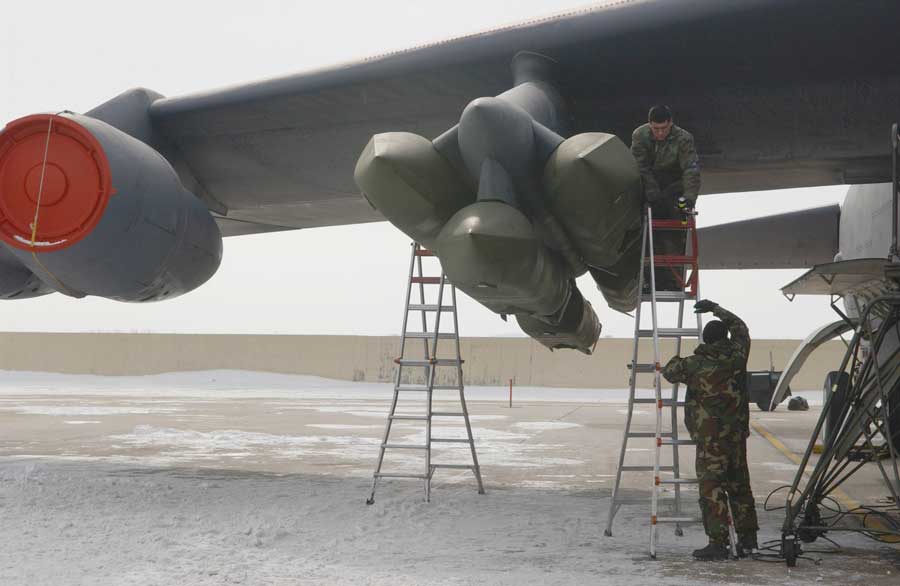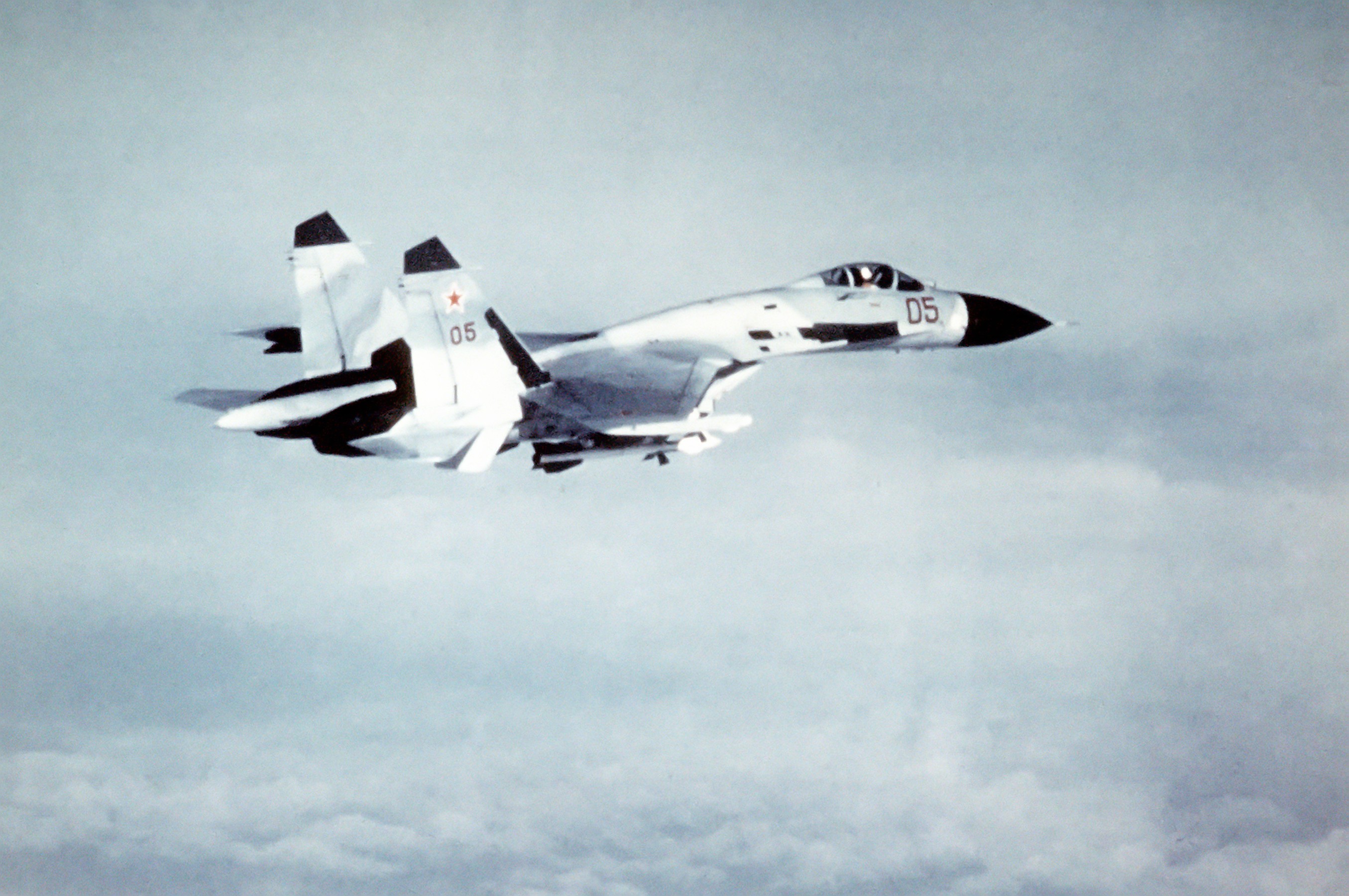|
AGM-129 ACM
The AGM-129 ACM (Advanced Cruise Missile) was a low-observable, subsonic, turbofan-powered, air-launched cruise missile originally designed and built by General Dynamics and eventually acquired by Raytheon Missile Systems. Prior to its withdrawal from service in 2012, the AGM-129A was carried exclusively by the US Air Force's B-52H Stratofortress bombers. Early development In 1982 the US Air Force began studies for a new cruise missile with low-observable characteristics after it became clear that the AGM-86B cruise missile would have difficulty penetrating future air defense systems. The AGM-86B relied on low-altitude flight to penetrate the Soviet air defense system centered on surface to air missiles. The deployment of the airborne early warning systems, together with the Zaslon PESA radar on MiG-31 and Myech radar on Su-27 interceptors, all three "look-down/shoot-down" radars, reduced the likelihood that the low-altitude AGM-86B would reach its target. The solution was ... [...More Info...] [...Related Items...] OR: [Wikipedia] [Google] [Baidu] |
Air-launched Cruise Missile
An air-launched cruise missile (ALCM) is a cruise missile that is launched from a military aircraft. Current versions are typically standoff weapons which are used to attack predetermined land targets with conventional, nuclear or thermonuclear payloads. Specific types of ALCMs (current, past and under development) include: *AGM-28 Hound Dog (USA) *AGM-84H/K SLAM-ER (USA) *AGM-86 ALCM (USA) *AGM-129 ACM (USA) * AGM-158 JASSM (USA) *AGM-158C LRASM (USA) * Air-Sol Moyenne Portée ASMP (France) *ASN4G (France) * BrahMos (India/Russia) *BrahMos-NG (India) *BrahMos-II (India/Russia) *CJ-10 (China) *Delilah (Israel) *Hatf-VIII (Ra'ad) (Pakistan) *Hypersonic Attack Cruise Missile USA *Ra'ad-II (Pakistan) *Joint Strike Missile (Norway/USA) *Kalibr-A (Russia) *KEPD 350 (Germany/Sweden) *Kh-20 (USSR) *Kh-32 (Russia) *Kh-35 (Russia) * Kh-55/Kh-555 (USSR/Russia) *Kh-59 (USSR/Russia) *Kh-61 (USSR/Russia) * Kh-101/102 (Russia) *KSR-5 (USSR) *LRSO (Long Range Stand Off Weapon) (USA) * MICLA-BR ... [...More Info...] [...Related Items...] OR: [Wikipedia] [Google] [Baidu] |
Air Defense
Anti-aircraft warfare, counter-air or air defence forces is the battlespace response to aerial warfare, defined by NATO as "all measures designed to nullify or reduce the effectiveness of hostile air action".AAP-6 It includes surface based, subsurface ( submarine launched), and air-based weapon systems, associated sensor systems, command and control arrangements, and passive measures (e.g. barrage balloons). It may be used to protect naval, ground, and air forces in any location. However, for most countries, the main effort has tended to be homeland defence. NATO refers to airborne air defence as counter-air and naval air defence as anti-aircraft warfare. Missile defence is an extension of air defence, as are initiatives to adapt air defence to the task of intercepting any projectile in flight. In some countries, such as Britain and Germany during the Second World War, the Soviet Union, and modern NATO and the United States, ground-based air defence and air defence aircraf ... [...More Info...] [...Related Items...] OR: [Wikipedia] [Google] [Baidu] |
Infrared Signature
Infrared signature, as used by defense scientists and the military, is the appearance of objects to infrared sensors. An infrared signature depends on many factors, including the shape and size of the object, temperature, and emissivity, reflection of external sources (earthshine, sunshine, skyshine) from the object's surface, the background against which it is viewed and the waveband of the detecting sensor. As such there is no all-encompassing definition of infrared signature nor any trivial means of measuring it. For example, the infrared signature of a truck viewed against a field will vary significantly with changing weather, time of day and engine loading. Two fairly successful examples of defining the infrared signature of an object are the apparent temperature difference at the sensor and the contrast radiant intensity (CRI) definitions. Apparent temperature difference The apparent temperature difference method of defining infrared signature gives the physical temperature ... [...More Info...] [...Related Items...] OR: [Wikipedia] [Google] [Baidu] |
Radar Cross Section
Radar cross-section (RCS), also called radar signature, is a measure of how detectable an object is by radar. A larger RCS indicates that an object is more easily detected. An object reflects a limited amount of radar energy back to the source. The factors that influence this include: *the material with which the target is made; *the size of the target relative to the wavelength of the illuminating radar signal; *the absolute size of the target; *the incident angle (angle at which the radar beam hits a particular portion of the target, which depends upon the shape of the target and its orientation to the radar source); *the reflected angle (angle at which the reflected beam leaves the part of the target hit; it depends upon incident angle); *the polarization of the transmitted and the received radiation with respect to the orientation of the target. While important in detecting targets, strength of emitter and distance are not factors that affect the calculation of an RCS becaus ... [...More Info...] [...Related Items...] OR: [Wikipedia] [Google] [Baidu] |
Forward Swept Wings
A forward-swept wing is an aircraft wing configuration in which the quarter-chord line of the wing has a forward sweep. Typically, the leading edge also sweeps forward. Characteristics The forward-swept configuration has a number of characteristics which increase as the sweep angle, angle of sweep increases. Main spar location The rearward location of the main wing spar would lead to a more efficient interior arrangement with more usable space. Inward spanwise flow Air flowing over any swept wing tends to move spanwise towards the rearmost end of the wing. On a rearward-swept wing this is outwards towards the tip, while on a forward-swept wing it is inwards towards the root. As a result, the dangerous tip stall condition of a rearward-swept design becomes a safer and more controllable root stall on a forward-swept design. This allows full aileron control despite loss of lift, and also means that drag-inducing leading edge slots or other devices are not required. With the ai ... [...More Info...] [...Related Items...] OR: [Wikipedia] [Google] [Baidu] |
Senior Prom
A promenade dance, commonly called a prom, is a dance party for high school students. It may be offered in semi-formal black tie or informal suit for boys, and evening gowns for girls. This event is typically held near the end of the school year. There may be individual junior (11th grade) and senior (12th grade) proms or they may be combined. At a prom, a "prom king" and a "prom queen" may be revealed. These are honorary titles awarded to students elected in a school-wide vote prior to the prom. Other students may be honored with inclusion in a ''prom court''. The selection method for a prom court is similar to that of homecoming queen/princess, king/prince, and court. Inclusion in a prom court may be a reflection of popularity of those students elected and their level of participation in school activities, such as clubs or sports. The prom queen and prom king may be given crowns to wear. Members of the prom court may be given sashes to wear and photographed together. Similar e ... [...More Info...] [...Related Items...] OR: [Wikipedia] [Google] [Baidu] |
Lockheed Corporation
The Lockheed Corporation was an American aerospace manufacturer. Lockheed was founded in 1926 and later merged with Martin Marietta to form Lockheed Martin in 1995. Its founder, Allan Lockheed, had earlier founded the similarly named but otherwise-unrelated Loughead Aircraft Manufacturing Company, which was operational from 1912 to 1920. History Origins Allan Loughead and his brother Malcolm Loughead had operated an earlier aircraft company, Loughead Aircraft Manufacturing Company, which was operational from 1912 to 1920. The company built and operated aircraft for paying passengers on sightseeing tours in California and had developed a prototype for the civil market, but folded in 1920 due to the flood of surplus aircraft deflating the market after World War I. Allan went into the real estate market while Malcolm had meanwhile formed a successful company marketing brake systems for automobiles. On December 13, 1926, Allan Lockheed, Jack Northrop, John Northrop, Kenneth K ... [...More Info...] [...Related Items...] OR: [Wikipedia] [Google] [Baidu] |
Look-down/shoot-down
A radar system has look-down/shoot-down capability if it can detect, track and guide a weapon to an air target that (as seen by the radar) is silhouetted against the ground. Problem and naming Airborne intercept radar relying exclusively on time domain radar techniques is effectively blind any time the radar's antenna is aimed towards the Earth's surface. That is because pointing the radar at the ground produces a large reflection. That reflection and the ensuing "cluttered" display overwhelms human operators and computing systems (see ground clutter). Radar systems of this type are essentially useless when pointed ‘down’ at the surface, with the zone of weakness near and below the horizon. This zone can be actively utilized by enemy combatants wishing to hide from radar tracking utilizing a technique known as terrain masking. Frequency domain signal processing combined with time domain signal processing, as in pulse-Doppler radar, is a way to eliminate that vulnerability. ... [...More Info...] [...Related Items...] OR: [Wikipedia] [Google] [Baidu] |
Su-27
The Sukhoi Su-27 (russian: Сухой Су-27; NATO reporting name: Flanker) is a Soviet-origin twin-engine supermaneuverable fighter aircraft designed by Sukhoi. It was intended as a direct competitor for the large US fourth-generation jet fighters such as the Grumman F-14 Tomcat and McDonnell Douglas F-15 Eagle, with range, heavy aircraft ordnance, sophisticated avionics and high maneuverability. The Su-27 was designed for air superiority missions, and subsequent variants are able to perform almost all aerial warfare operations. It was designed with the Mikoyan MiG-29 as its complement. The Su-27 entered service with the Soviet Air Forces in 1985. The primary role was long range air defence against American SAC Rockwell B-1B Lancer and Boeing B-52G and H Stratofortress bombers, protecting the Soviet coast from aircraft carriers and flying long range fighter escort for Soviet heavy bombers such as the Tupolev Tu-95, Tupolev Tu-22M and Tupolev Tu-160. The Su-27 was devel ... [...More Info...] [...Related Items...] OR: [Wikipedia] [Google] [Baidu] |
Myech Radar
N001 Mech (russian: Меч, lit=''Sword'') is a Russian (former USSR) all-weather multimode airborne radar developed by the Tikhomirov Scientific Research Institute of Instrument Design (NIIP) for the Su-27 multi-role combat aircraft. Description The N001 radar for the Su-27 was designed by Viktor Grishin. Pushing the state of the art for the USSR, the original design, known as Mech, was supposed to draw heavily on technologies developed for the experimental Soyuz radar program led by NPO Istok. It was intended to have a great deal of commonality with the MiG-29's N019 Rubin radar. N001 has a 1.075m antenna diameter twist-cassegrain antenna. A pulse-doppler design operating in the 3 cm band using medium and high PRFs for optimum lookdown capability, the N001 has a search range of 80–100 km against a 3m m RCS target in a headon engagement, 140 km against a large bomber. It can track a 3m target at 65 km. In a pursuit engagement, search range for a 3m target ... [...More Info...] [...Related Items...] OR: [Wikipedia] [Google] [Baidu] |
MiG-31
The Mikoyan MiG-31 (russian: link=no, Микоян МиГ-31; NATO reporting name: Foxhound) is a supersonic interceptor aircraft that was developed for use by the Soviet Air Forces. The aircraft was designed by the Mikoyan design bureau as a replacement for the earlier MiG-25 "Foxbat"; the MiG-31 is based on and shares design elements with the MiG-25. The MiG-31 is among the fastest combat jets in the world. It continues to be operated by the Russian Air Force and the Kazakh Air Force following the end of the Cold War and the collapse of the Soviet Union in 1991. The Russian Defence Ministry expects the MiG-31 to remain in service until 2030 or beyond; that was confirmed in 2020 when an announcement was made to extend the service lifetime from 2,500 to 3,500 hours on the existing airframes. Development Origins The single-seat MiG-25 could achieve high speed, altitude and rate of climb; however, it lacked maneuverability at interception speeds and was difficult to fly a ... [...More Info...] [...Related Items...] OR: [Wikipedia] [Google] [Baidu] |
Zaslon
The Russian (former USSR) BRLS-8B "Zaslon" (Barrier) is an all-weather multimode airborne radar developed between 1975 and 1980 by the Tikhomirov Scientific Research Institute of Instrument Design as part of the weapons control system of the MiG-31 supersonic interceptor. The NATO reporting name for the radar is Flash Dance with the designations "SBI-16", "RP-31", "N007" and "S-800" also being associated with the radar. Description The Zaslon is a pulse-Doppler radar with a passive electronically scanned array (PESA) antenna and digital signal processing. The antenna used by the Zaslon is actually a multi-channel system comprising two separate electronically controlled arrays, an X band radar with 1700 emitters and a L band transponder with 64 emitters brought together into a single antenna. The antenna has a diameter of 1.1 meters and is fixed in position with a scanning sector of ±70 degrees in azimuth and +70/−60 degrees in elevation. The X-band components of the radar uses ... [...More Info...] [...Related Items...] OR: [Wikipedia] [Google] [Baidu] |



_in_2001.jpg)


